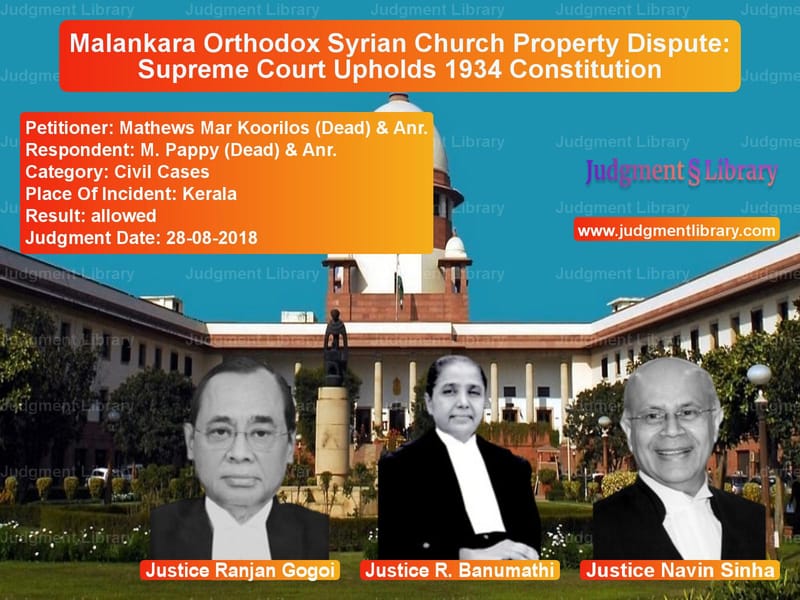Malankara Orthodox Syrian Church Property Dispute: Supreme Court Upholds 1934 Constitution
The case of Mathews Mar Koorilos (Dead) & Anr. vs. M. Pappy (Dead) & Anr. revolved around the dispute over the control and administration of St. Mary’s Church, Kattachira. The appellants, representing the Malankara Orthodox Syrian Church, sought a declaration that the Quilon Metropolitan and the Vicar appointed by him had exclusive rights to conduct religious services and manage the church properties.
Background of the Case
The case originated from a suit filed by the appellants in O.S. No.187 of 1977. The appellants claimed that an assignment-cum-gift deed (Ext.-A3) dated 29.06.1972 transferred the church and its properties to the Metropolitan of the Quilon Diocese, granting him exclusive rights over its administration. The respondents, representing the Parishioners, challenged this claim and argued that the church was a trust meant for the benefit of its Parishioners, who retained the right to manage it.
Arguments Presented
Appellants’ Argument
- The assignment deed (Ext.-A3) legally transferred the church’s ownership and management rights to the Metropolitan.
- The church was part of the Malankara Orthodox Syrian Church and had to be governed by the 1934 Constitution.
- The respondents could not question the Metropolitan’s authority as per the provisions of the gift deed.
- The church had historically accepted the spiritual and temporal authority of the Malankara Church.
Respondents’ Stand
- The Parishioners argued that the church was established for their spiritual benefit and was to be administered per the 1959 Constitution framed by them.
- They contended that the 1934 Constitution did not govern the church.
- The Metropolitan had no unilateral right to appoint Vicars and manage the church properties.
Lower Court Rulings
The trial court ruled in favor of the appellants, affirming their right to administer the church and its properties. It granted a permanent injunction against the respondents, preventing them from interfering with the church’s management.
The respondents appealed to the High Court of Kerala, which reversed the trial court’s decision, stating:
- Though the title of the properties vested with the Quilon Diocese, the management of the church and its properties remained with the Parishioners.
- The Metropolitan did not have absolute authority to appoint Vicars or control the church.
- The church’s administration was not governed by the 1934 Constitution.
Supreme Court’s Verdict
The Supreme Court overturned the High Court’s ruling, reaffirming the validity and binding nature of the 1934 Constitution. The Court held:
“The 1934 Constitution is valid and binding upon the Parishioners. The Parish Church has to be managed as per the powers conferred under the 1934 Constitution. It is not open to any individual church to have a parallel system of management in the churches under the guise of spiritual supremacy in the Patriarch.”
The Supreme Court referred to earlier landmark judgments, including:
- Moram Mar Basselios Catholicos v. Thukalan Paulo Avira (AIR 1959 SC 31), which established that the Malankara Church’s authority was final in matters of church governance.
- Most Rev. P.M.A. Metropolitan v. Moran Mar Marthoma (1995 Supp (4) SCC 286), which held that the 1934 Constitution governed all parish churches.
- K.S. Varghese v. Saint Peter’s and Saint Paul’s Syrian Orthodox Church (2017) 15 SCC 333, which reinforced that individual churches could not create parallel management structures.
The Court further emphasized:
“Full effect has to be given to the finding that the spiritual power of the Patriarch has reached to a vanishing point. Consequently, he cannot interfere in the governance of parish churches by appointing Vicars, priests, Deacons, Prelates (High Priests), etc., and thereby cannot create a parallel system of administration.”
Legal Significance
This ruling reiterates that the 1934 Constitution remains the supreme governing document for all Malankara Orthodox Syrian Churches. It invalidates attempts to form independent church managements outside the Constitution’s provisions and ensures centralized control remains with the Malankara Metropolitan.
Conclusion
The Supreme Court’s judgment is a crucial reaffirmation of the Malankara Church’s authority. By setting aside the High Court’s ruling and enforcing the 1934 Constitution, the Court has provided clarity on the governance of the church’s administration, ensuring that disputes regarding spiritual and temporal control are resolved within the legal framework established by past rulings.
Petitioner Name: Mathews Mar Koorilos (Dead) & Anr..Respondent Name: M. Pappy (Dead) & Anr..Judgment By: Justice Ranjan Gogoi, Justice R. Banumathi, Justice Navin Sinha.Place Of Incident: Kerala.Judgment Date: 28-08-2018.
Don’t miss out on the full details! Download the complete judgment in PDF format below and gain valuable insights instantly!
Download Judgment: Mathews Mar Koorilos vs M. Pappy (Dead) & An Supreme Court of India Judgment Dated 28-08-2018.pdf
Direct Downlaod Judgment: Direct downlaod this Judgment
See all petitions in Property Disputes
See all petitions in Succession and Wills
See all petitions in Judgment by Ranjan Gogoi
See all petitions in Judgment by R. Banumathi
See all petitions in Judgment by Navin Sinha
See all petitions in allowed
See all petitions in supreme court of India judgments August 2018
See all petitions in 2018 judgments
See all posts in Civil Cases Category
See all allowed petitions in Civil Cases Category
See all Dismissed petitions in Civil Cases Category
See all partially allowed petitions in Civil Cases Category







